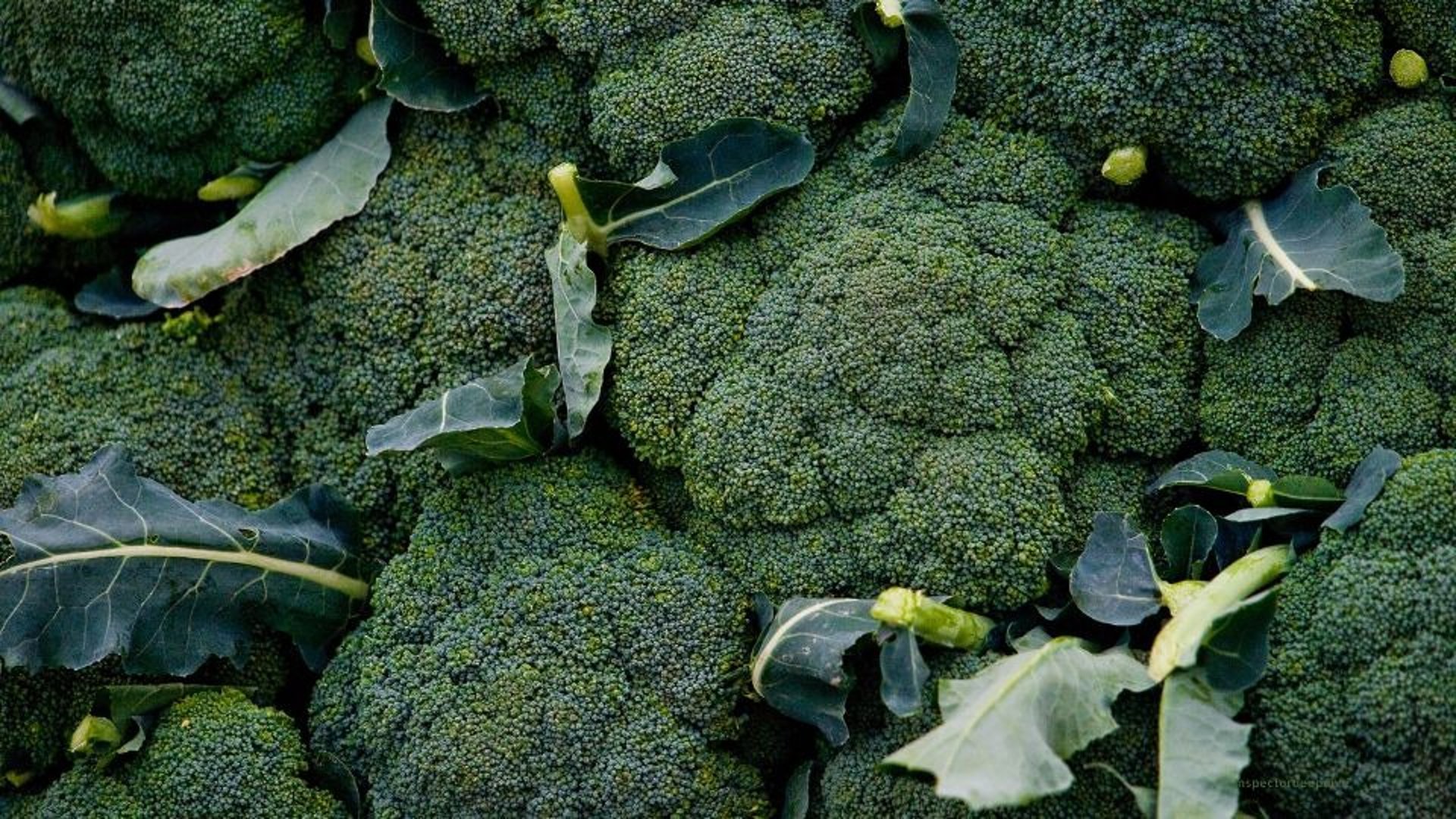
Broccoli Nutrition Facts: Vitamins, Minerals, and Anti-Inflammatory Power

Scientific Name: Brassica oleracea var. italica
What Is Broccoli?
Broccoli is a popular cruciferous vegetable recognized by its dense green florets and thick stalks. It has a slightly bitter taste when raw, which mellows and sweetens upon cooking. Widely considered one of the most nutrient-dense vegetables available, broccoli is a powerhouse of health benefits.
Origin and Cultivation
Broccoli originated in the Mediterranean region, where it was cultivated from wild cabbage. It gained popularity in Italy before spreading across Europe and eventually the rest of the world. Today, it's grown globally, with major producers including China, India, the United States, and Mexico. Broccoli thrives in cool climates.
Seasonality & Availability
While broccoli's peak season is typically fall and winter in temperate climates, it's available year-round in fresh, frozen, or canned forms. When choosing fresh broccoli, look for firm heads with a deep green color and no yellowing.
Benefits of Broccoli
Broccoli is packed with compounds that offer numerous health advantages:
Anti-Cancer Properties: Rich in sulforaphane, a compound with potent anti-cancer effects.
Antioxidant Power: High in antioxidants that reduce inflammation and protect cells from damage.
Detoxification Support: Glucosinolates in broccoli aid liver detoxification.
Gut Health: Its high fiber content promotes healthy digestion and regularity.
Heart Health: May improve heart health by helping to lower cholesterol levels.
The "Anti" Factors in Broccoli
Anti-inflammatory: Reduces inflammation thanks to sulfur compounds like sulforaphane and flavonoids.
Antioxidant: Neutralizes harmful free radicals, protecting cells from oxidative stress.
Anti-cancer: Contains compounds like sulforaphane and indole-3-carbinol that may inhibit the growth of certain cancers (e.g., breast, prostate, colon).
Anti-bacterial: Shows strong antimicrobial properties, even against bacteria like Helicobacter pylori.
Anti-hypertensive: Helps lower blood pressure by relaxing blood vessels and improving circulation.
Nutritional Breakdown
Cooked Broccoli (per 100g)
Vitamins:
Vitamin C: 70–90 mg (boosts immunity, skin health; some loss from cooking)
Vitamin K: 110 µg (essential for blood clotting, bone health; slightly increased absorption when cooked)
Vitamin A: 35 µg (supports vision, immune function; slightly increased absorption when cooked)
Folate: 55 µg (aids cell division, important in pregnancy; some loss from cooking)
Vitamin B6: 0.2 mg (supports brain development, metabolism; slightly increased absorption when cooked)
Minerals:
Potassium: 350 mg (regulates fluid balance, heart health; better absorption when cooked)
Calcium: 55 mg (promotes strong bones and teeth; improved absorption when cooked)
Iron: 1.5 mg (aids oxygen transport; bioavailability can double from cooking)
Magnesium: 25 mg (energy production, muscle function; better absorption when cooked)
Zinc: 0.5 mg (immune support, wound healing; improved absorption when cooked)
Manganese: 0.25 mg (bone development, metabolism; better absorption when cooked)
Copper: 0.06 mg (aids iron absorption, connective tissue health; improved absorption when cooked)
Macronutrients:
Calories: 40 kcal (low-calorie, ideal for light meals or snacks)
Water: 85 g (keeps you hydrated, supports cellular function)
Protein: 3.2 g (provides essential amino acids for muscle repair)
Total Fat: 0.5 g (mostly unsaturated fats, minimal contribution to daily intake)
Carbohydrates: 7.5 g (includes natural sugars and dietary fiber)
Dietary Fiber: 3.0 g (promotes digestive health and satiety)
Sugars: 2.0 g (naturally occurring sugars like glucose and fructose)
Potential Risks
Broccoli can cause bloating or gas in some individuals due to its high fiber content. Raw broccoli contains goitrogens, which in very large amounts, might affect thyroid function. Overcooking can reduce its nutrient content, especially Vitamin C.
Medication or Supplement Interactions
Its high Vitamin K content may interfere with blood thinners like warfarin. Sulforaphane supplements might interact with certain medications, so consult a doctor. The fiber content could also interfere with nutrient absorption if consumed excessively.
Who Should Be Cautious?
People with thyroid issues should avoid excessive raw broccoli consumption.
Individuals prone to bloating or gas may need to moderate their intake.
Those on blood thinners should monitor their Vitamin K intake.
Surprising Truths About Broccoli
The leaves and stems are edible and highly nutritious, though often discarded.
Broccoli is a member of the cabbage family, alongside cauliflower and kale.
It contains more Vitamin C than an orange per serving.
Despite its reputation, it pairs well with bold flavors like garlic and cheese.
Environmental Impact
Broccoli requires moderate water use and thrives in cooler climates. Its carbon footprint is generally low due to widespread local production. Consider composting or cooking the leaves and stems, which are often discarded, to reduce waste.
Best Time to Eat Broccoli
With meals to support digestion and nutrient absorption.
In cooler months when fresh broccoli is in peak season.
Before heavy meals to take advantage of its fiber content.
Label Reading Tips (for packaged broccoli)
Look for frozen broccoli without added sauces or sodium. Rinse canned broccoli thoroughly to reduce its salt content. Organic isn't always necessary, as pesticide levels in broccoli are generally low.
Chef or Culinary Tips
Don't discard the stems peel and slice them for cooking. Pair with lemon juice or vinegar to balance any bitterness. Blanch before freezing to preserve texture and color. Avoid overcooking to retain nutrients and its vibrant green color.
Storage & Shelf Life
Fresh broccoli: Store in the fridge for up to 1 week in a loose plastic bag.
Cooked broccoli: Lasts 3–5 days refrigerated.
Frozen broccoli: Up to 12 months.
Recipes & Meal Ideas
Garlic-roasted broccoli with Parmesan.
Broccoli slaw with tahini dressing.
Broccolini stir-fry with oyster sauce.
Steamed broccoli with lemon and olive oil.
Blended broccoli soup with potatoes and herbs.
The Science Behind Broccoli
Broccoli contains powerful plant compounds that support detoxification, cellular health, and hormone balance. These bioactive substances work at a molecular level to promote long-term wellness.
Sulforaphane: Activates detoxification enzymes and fights oxidative stress by boosting the body’s natural antioxidant defenses. It supports liver function and may reduce cancer risk by protecting cells from DNA damage.
Glucosinolates: Break down into active compounds like sulforaphane and indole-3-carbinol, which help neutralize toxins and regulate inflammation.
Lutein and Zeaxanthin: Carotenoids found in broccoli that protect eye health by filtering harmful blue light and reducing the risk of age-related macular degeneration.
Indole-3-carbinol: Released when broccoli is chopped, chewed, or cooked, this compound helps the liver metabolize estrogen more efficiently, supporting hormonal balance and potentially lowering the risk of hormone-sensitive cancers (e.g., breast, prostate). It also acts as a potent antioxidant, reduces inflammation, and influences gene expression related to cell growth and repair.
Together, these compounds make broccoli more than just a nutrient-rich vegetable it’s a functional food with real, science-backed benefits that reach deep into your cells.
Scientific Breakthroughs As Of 2025
Enhanced Sulforaphane: Researchers discovered a new broccoli cultivar with significantly higher sulforaphane content through gene-editing, showing stronger anti-cancer effects, especially for colorectal and prostate cancer.
Gut Microbiome Synergy: Studies revealed that combining broccoli with specific gut bacteria enhances the bioavailability of its antioxidants, leading to better detoxification and reduced inflammation.
Cognitive Boost: A 2025 clinical trial showed broccoli extract supplementation improved cognitive function in older adults, possibly by supporting mitochondrial function and reducing oxidative stress.
Diabetes Management: New findings suggest broccoli may help manage type 2 diabetes by improving insulin sensitivity and liver function when consumed regularly.
Nutrient Retention: Food scientists developed innovative cooking methods that preserve up to 90% of broccoli’s Vitamin C and glucosinolates, ensuring maximum nutrient retention.
FAQs
Can I eat broccoli stems?
Yes, they are highly nutritious and versatile.
Is broccoli good for weight loss?
Yes, it's low in calories and high in fiber, which aids in satiety.
Why does broccoli smell when cooked?
This is due to sulfur compounds, which are harmless but noticeable.
How do I know if broccoli is fresh?
Look for firm heads with tight florets and no yellowing.
Broccoli Nutrition Facts: Vitamins, Minerals, and Anti-Inflammatory Power
info@inspectordeepdive.com
© 2025 food.InspectorDeepDive.com. All rights reserved. Content may not be copied or republished without permission.
This article is for informational purposes only. InspectorDeepDive.com does not provide medical advice. Always consult a licensed healthcare provider before making dietary or health decisions.
